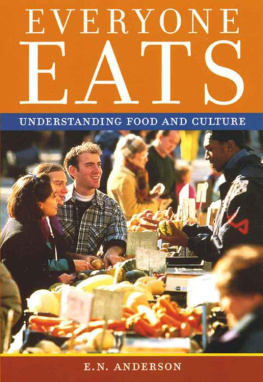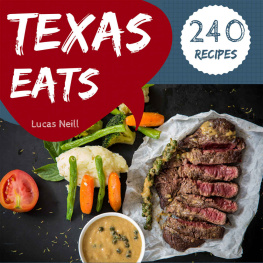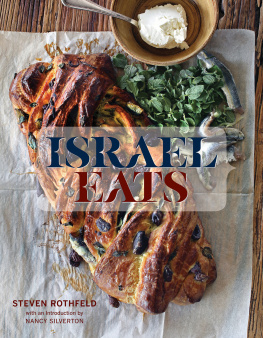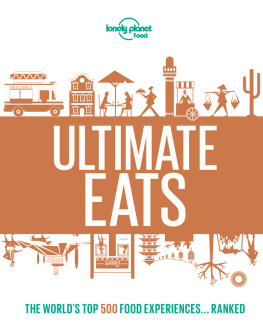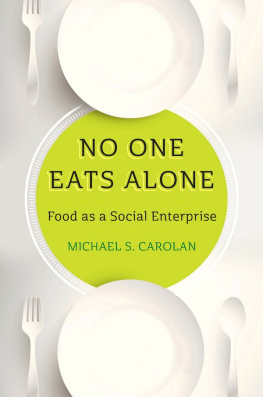Everyone Eats
Everyone Eats
Understanding Food and Culture
E. N. Anderson

NEW YORK UNIVERSITY PRESS
New York and London
www.nyupress.org
2005 by New York University
All rights reserved
Library of Congress Cataloging-in-Publication Data
Anderson, Eugene N. (Eugene Newton), 1941
Everyone eats: understanding food and culture /
E.N. Anderson.
p. cm.
Includes bibliographical references and index.
ISBN 0814704956 (cloth: alk. paper)
ISBN 081470496 4 (pbk.: alk. paper)
1. Food habits. 2. Food preferences. I. Title.
GT2850.A6644 2004
394.1'2dc22 2004014366
New York University Press books are printed on acid-free paper,
and their binding materials are chosen for strength and durability.
Manufactured in the United States of America
c 10 9 8 7 6 5 4 3 2 1
p 10 9 8 7 6 5 4 3 2 1
To all the unknown men and women who created
the staple foods and the cuisines of the world:
our greatest and least known benefactors.
With special thanks to my
(fortunately less obscure)
mentors, especially
Paul Buell
Jack Goody
Solomon Katz
Sidney Mintz
Contents
Introduction
Everyone Eats
Everyone eats rice
Yet no one knows why
When I say this now
People laugh at me
But instead of laughing along with them
You ought to step back and give it some thought
Think it over, and dont let up
I guarantee the time will come
When youll really have something worth laughing at
Ryokan, Great Fool: Zen Master Ryokan
1
The eighteenth-century Zen poet Ryokan probes us on many levels. He is most concerned with the ultimate questions: What is life? Why live? Is there such a thing as life or existence? Indeed, if you ponder those, you will find much to laugh about .
But there are more immediate, if no less laughable, questions posed by this innocent-seeming verse. Why do we eat what we eat? How did rice become synonymous with food throughout so much of eastern Asia?
We may further ask, How many of our foodways are determined by biology, how many by culture? Why do we love spices, sweets, coffee? Why do the British and the French not only eat so differently but also tease each other so mercilessly about it, century after century? The British call the French frogs, to which the French respond that the English have a hundred religions and only one sauce. Why did pizza zoom from total obscurity to favorite American food in only a few years?
In fact, human foodways are a complex result of the interaction of human nutritional needs, ecology, human logic or lack of it, and historical accident. Humans make food, but, as Karl Marx said of history, they do not make it just as they please (Marx 1986:276). They construct their foodways within limits set by biology, economics, and psychology. There is an infinite number of possible dietary regimes, but no dietary regime can long endure if it does not provide protein, carbohydrates, fats, vitamins, and necessary minerals.
Ryokan also stimulates us to ask, Who made these decisions? Who developed the staple foods that support us? Who created the wondrous variety and complexity of cuisines that so greatly enrich our lives? The answer is thought provoking, and this time the humor is subdued and gentle. No one knows the names of the great inventors. We know the names of a few latter-day chefs, but food historyunlike the history of war and violenceis generally a history without names. Whoever developed bread wheata complicated, difficult hybridbenefited humanity more than any named hero; yet we have no clue as to his or her name or language, though we know every detail of the lives of arch-villains like Stalin and Hitler. The unknown Mexican indigenous people who developed maize gave life to countless people. We know nothing about the maize breeders, though we know the names of the conquistadors and generals who massacred their descendents.
Millions and millions of humble, gentle, caring human beingsfarmers and homemakers, innkeepers and famine relief workers, lovers and helpersgave us the benefit of their insight, brilliance, creativity, and labor. To the familiar record of oppression and exploitation, they counterpose a hidden record of generosity, concern, and responsibility. We do not know who they were. We know nothing about them. They live on, but only in the silence of bread, the calm of a bowl of rice, the joy of wine, the light of a cup of coffee.
Strange immortality! To help so much, to pour the goodness and care of life into the most neglected and most important of everyday things, and then to be forgotten. Perhaps they did not care; perhaps they felt that fame is for those who have nothing better to leave.
Even their modern descendents, whose names we know, are not household words. From the late unlamented twentieth century, almost everyone knows of Madonna and Elvis, but few indeed recall E. V. McCollum or Albert Szent-Gyrgy (the discoverers of vitamins A and C, respectively).
Ryokan, in other poems, poses the classic Buddhist opposition between the glory, fame, and transience of kings and the obscure but enduring world of the common folk. Those ordinary people must survive the wars and famines that their rulers unleash. Somehow, those ordinary people have not only kept their loved ones fed; they have steadily improved crops, recipes, and cultures. One can only repeat, in their memory, that most poignant of all food metaphors: Ye are the salt of the earth (Matthew 5:13).
2
Savoir pour prvoir, prvoir pour pouvoir. (Know in order to predict, predict in order to be able to do something.)
Attributed to Condorcet (France, eighteenth century)
Knowing about food is fun, but there are more cogent reasons to worry about understanding foodways. At least 15 percent of the worlds population does not have enough to eat (Farley 2002). The figure rises to 18 percent of those in developing regions. UNICEF reports that almost 30 percent of children are undernourished (UNICEF 2002). Most of the hungry are in areas of war and unrest, or of massive disease epidemics, especially AIDS epidemics. Conversely, many people have too much, or at least too much of the wrong things. A far larger percentage of the worlds people has too little iron, or too little vitamin A, or folic acid deficiency (a common cause of horrible birth defects); even iodine, easily added to salt, is deficient in some areas (UNICEF 2002). The problems of hunger, of obesity, and of malnutrition are among the worlds most serious concerns. Diabetes, heart disease, cancer, and other diseases owe much of their prevalence to poor eating habits.
Humanity has succeededonly recentlyin providing enough food for everyone. The planet produces enough for all, for the first time in human history. Yet, undernutrition continues. Much food is lost in storage or distribution. Much more is wasted by careless people. Most important of all, those who need it are the poor who cannot afford it.
The future is cloudy. Rampant population growth threatens our hardwon food security. Environmental damage is an even more serious and immediate threat. Most unfortunate of all, however, are the wasteful eating habits of those who can afford to ignore the poor and the needy. Too much grain that could go to the poor is fed to chickens and cows. Too much farmland is producing luxury crops of no nutritional value. Too much of the worlds fish catch is thrown away because rich buyers accept only a few luxury species. Too many people who should be eating fruits and vegetables are living largely on highly processed foods, especially bulk starch, oil, and sugar.
Next page
